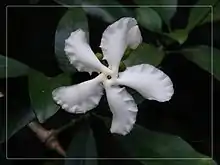Tabernaemontana ventricosa
Tabernaemontana ventricosa (commonly known as forest toad-tree or small-fruited toad-tree[3]) is a plant in the family Apocynaceae. It grows as a shrub or small tree up to 15 metres (50 ft) tall, with a trunk diameter of up to 30 centimetres (12 in) and has white sap. Leaves are paired (set opposite each other) and crowded near the ends of branches. They are oblong, leathery and a glossy dark green.[3] Flowers are fragrant with white, somewhat twisted lobes, often with a pale yellow center and are set in small clusters at the ends of branches. The fruit is dark green, set in spreading pairs of ellipsoids or oval, beaked pods, up to 10 centimetres (4 in) in diameter. Its habitat is forests from sea level to 1,850 metres (6,000 ft) altitude. In Zimbabwe, it is usually found as part of the understorey of evergreen forests.[3] Local medicinal uses include the treatment of wounds, fever and hypertension.[4] The plant is native to tropical central and southern Africa.[2][4]
| Tabernaemontana ventricosa | |
|---|---|
 | |
| Scientific classification | |
| Kingdom: | Plantae |
| Clade: | Tracheophytes |
| Clade: | Angiosperms |
| Clade: | Eudicots |
| Clade: | Asterids |
| Order: | Gentianales |
| Family: | Apocynaceae |
| Genus: | Tabernaemontana |
| Species: | T. ventricosa |
| Binomial name | |
| Tabernaemontana ventricosa | |
| Synonyms[2] | |
References
- Botanic Gardens Conservation International (BGCI) & IUCN SSC Global Tree Specialist Group (2020). "Tabernaemontana ventricosa". IUCN Red List of Threatened Species. 2020: e.T146457429A146457431. Retrieved 23 August 2020.
- "Tabernaemontana ventricosa". World Checklist of Selected Plant Families (WCSP). Royal Botanic Gardens, Kew. Retrieved 7 August 2017.
- "Tabernaemontana ventricosa". Flora of Zimbabwe. Retrieved 28 April 2019.
- Medicinal Plants. PROTA. 2008. pp. 597–598. ISBN 978-9-05782-204-9.
| Wikimedia Commons has media related to Tabernaemontana ventricosa. |
